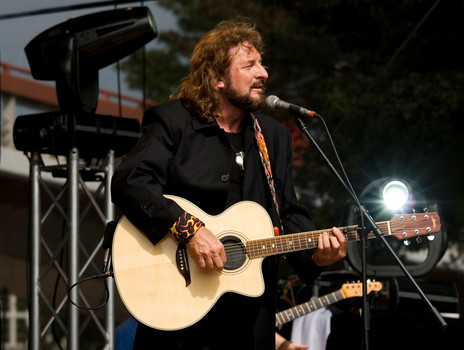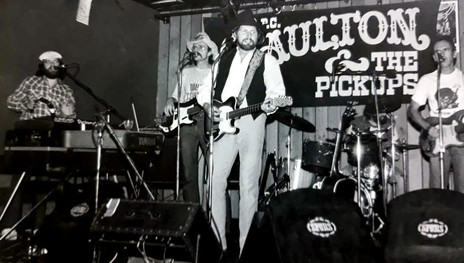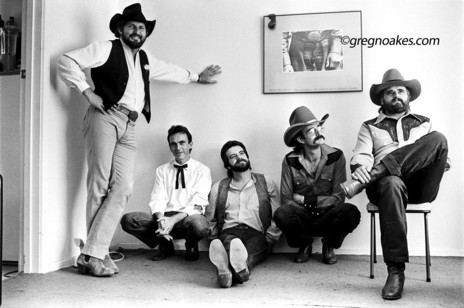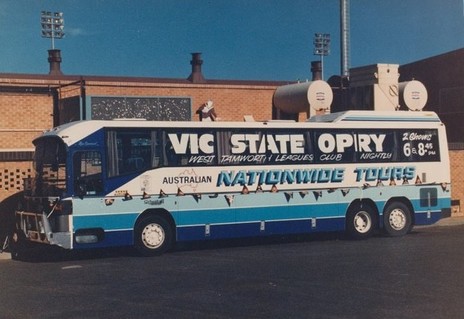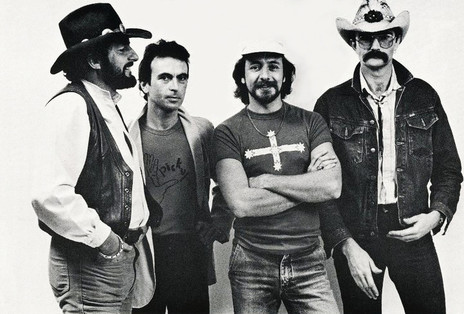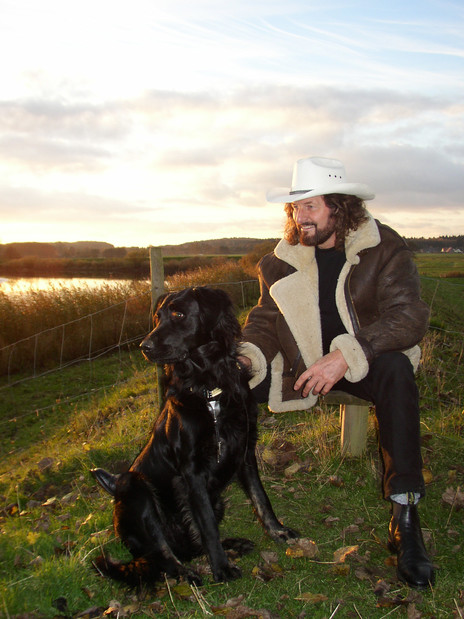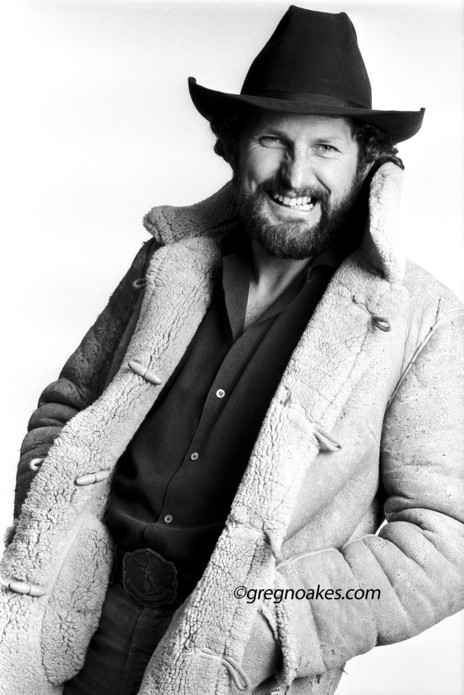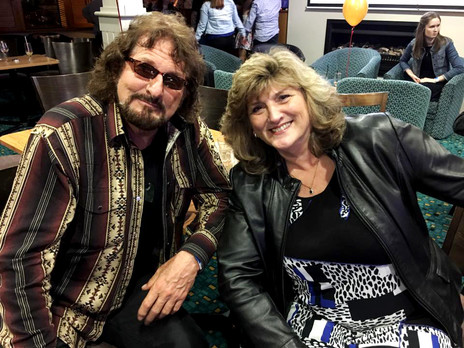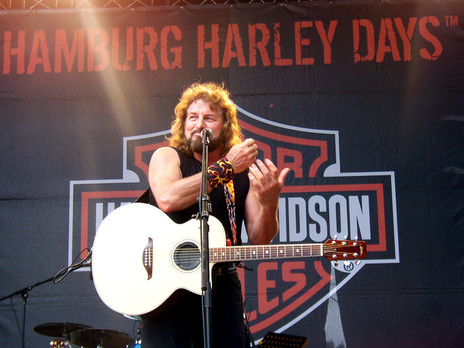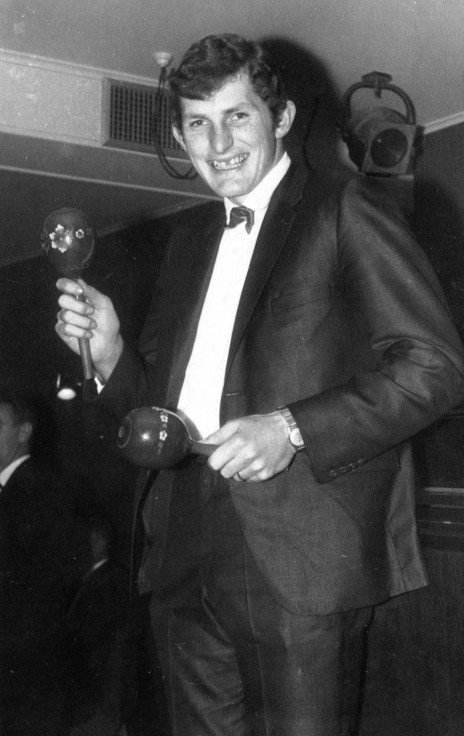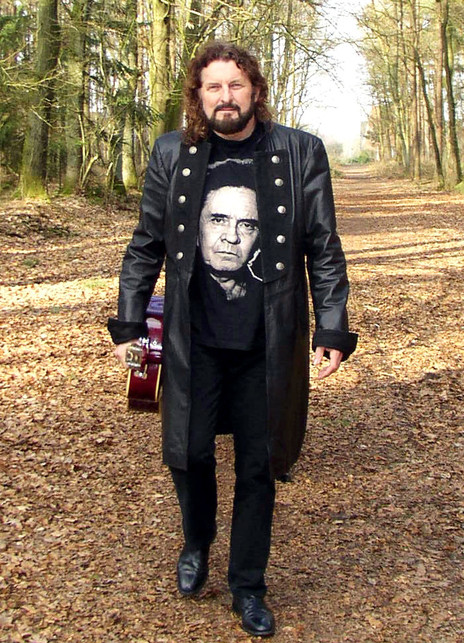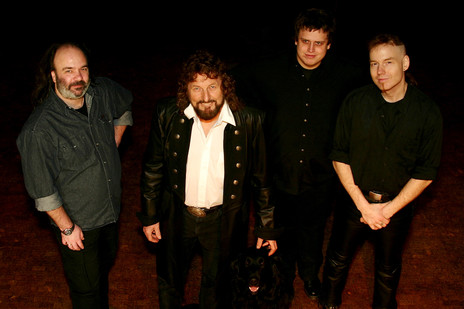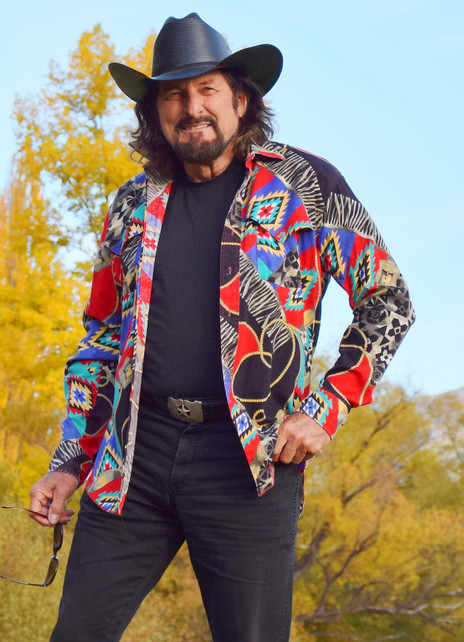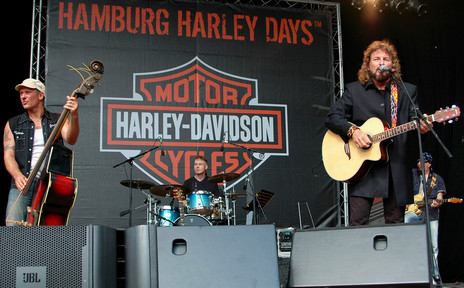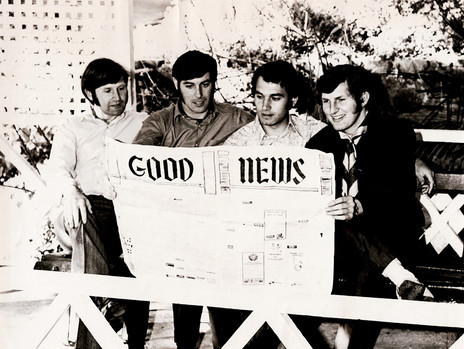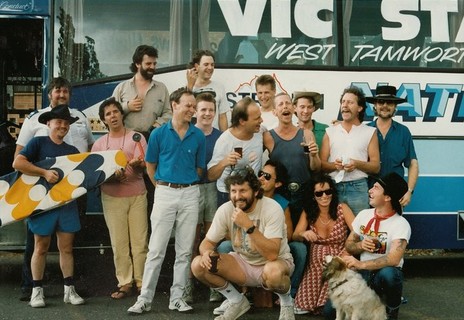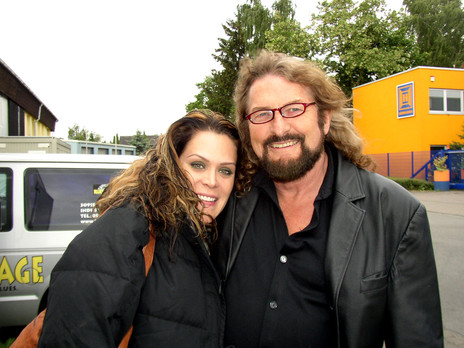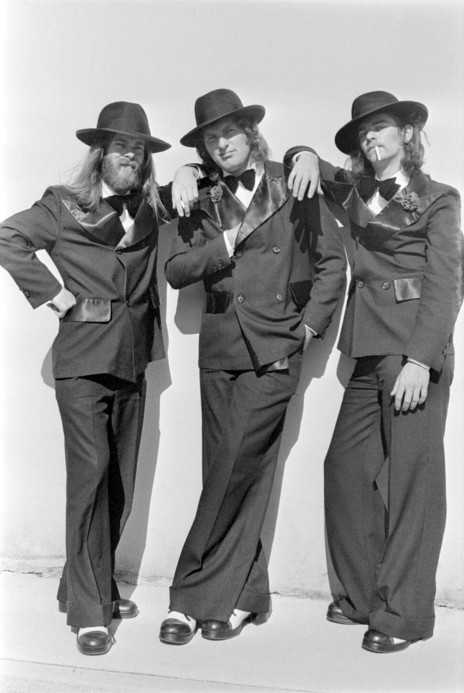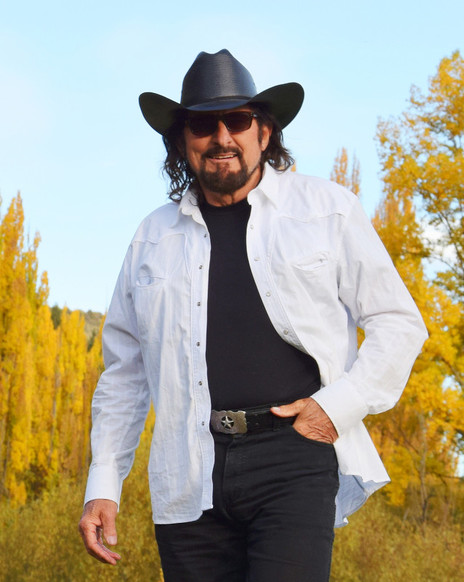Chock full of Kiwi musicians, the Pickups helped establish a popular Western-themed string of bars in Victoria and toured the east coast of Australia. Caulton completed a mysteriously shelved big-budget LP, organised one of Australia’s biggest country music festivals, and fronted the Vic State Opry revue, numbering up to 16 musicians and performers at a time.
“He always strived for the best, didn’t suffer bullshit and surrounded himself with some outstanding players,” former Pickups and Opry bandmate Craig Reeves told AudioCulture. “Understandably, he stood on a few toes along the way but achieved so much for the betterment of Aus country music during that period.”
Later Caulton followed his heart to Germany where he became popular on the British military bases and Jack Daniel’s touring circuits. A chance meeting in Germany led to him recording an album in Austin, Texas, with some of America’s top country session players.
Returning to New Zealand at the start of 2014, he was in the process of putting together stand-up comedy routines and a Johnny Cash tribute to take back to Germany when he died of a heart attack on 13 March 2018 – a week after his 71st birthday.
Growing up in Gisborne, Caulton learnt how to party and play music at an early age
Peter Stapylton Caulton, born 6 March 1947, revealed a little about his upbringing in the booklet to his Texas-recorded 1998 album Hard Road Tough Country. “I was born in Gisborne, New Zealand, which is the first city in the world to greet the sun each day,” he wrote. “The big Māori population in that part of the country were always partying and playing music, so I got to become enthusiastic about both at an early age.”
During his teenage years, Caulton’s father’s work as an investigations officer with the New Zealand Post Office saw the family settle in Christchurch. Caulton attended Riccarton High School, played in the hockey first XI, excelled in swimming and surf lifesaving, and started playing in bands.
Married in 1965 and working for the NZ Customs Department, Caulton was transferred to Wellington where he sang in the city’s coffee houses and was resident singer for a time with Garth Young’s band at the Pines nightspot. In 1967, he appeared on TV show C’mon and released ‘Six Days On The Road’ b/w ‘Truck Drivin’ Son Of A Gun’, produced by Howard Gable, on the La Gloria label.
After entertaining on P&O cruise ships and guesting alongside host Tex Morton on The Country Touch, Caulton appeared on the trite Tree 45 ‘Diddle, Diddle, Dumplin’ b/w ‘Everybody Wants To Be Somebody Else’, credited to Peter Caulton With Rosemary & Friends. The owner of the Tree label, Dene Kellaway, who produced the record, is now dead. The label’s current administrator doesn’t have any recollection of who Rosemary & Friends were.
When Caulton needed a band to back him for a 21st birthday party, he remembered back to a night with The Terry Crayford Trio at his Royal Oak residency at which Richard Nicholson had subbed on bass guitar. He rang Nicholson and they did the 21st with Jamie Linton on organ and Dave Duffell on drums. Soon after, they formed pub and club band Good News.
“We went out in the early stages playing places like Upper Hutt and Palmerston North,” Nicholson said. “Peter would do his stand-up comedy and had everybody in fits. We did quite a bit of that. The jokes and stories he had, he had people absolutely captivated and he’d have the whole place laughing.”
At a show for inmates at Wi Tako Prison in Upper Hutt, Caulton was backed by 1969 NZ Battle Of The Bands winners Cellophane. After Cellophane disbanded early in 1970, Caulton recruited their guitarist Dave Wellington for a new country line-up he was putting together with his former Good News bandmates Nicholson and Duffell.
While rehearsing at Caulton’s Porirua home, he introduced them to the modern country music of Johnny Cash, Merle Haggard, Glen Campbell, Waylon Jennings, and Charley Pride. They called the new band The Country Flyers.
“Peter was an entrepreneurial whiz kid, very confident talking with managers and promoters”
“We had no gigs booked at the start, but this was not a concern to Peter, he was positive he would organise stuff,” Wellington said. “This is when I learnt that Peter was an entrepreneurial whiz kid. He was very confident and had no problems talking with managers, promoters and anybody who would listen about how good his show was and that they should book us.”
The Country Flyers packed out the Cannons Creek Tavern in Porirua and Quinn’s Post in Upper Hutt, but a one-off gig in Levin with special guest Eddie Low only brought in six people and a gentleman who sat at the front table reading a newspaper. When Dave Wellington left for a carpentry apprenticeship in Auckland in 1972, he was replaced by Kevin Watson, and the Flyers took up a Thursday night residency at the Royal Tiger Tavern.
Also that year, Caulton released ‘Pickin’ White Gold’ b/w ‘My World Keeps Changin’’, engineered by Frank Douglas and again produced by Dene Kellaway for his Tree label. The recent Waylon Jennings version of ‘Pickin’ White Gold’ featured harmonica, so Caulton called on former Breakaways rhythm guitarist Midge Marsden, who had his own weekly blues radio show, to lay down some harp.
“I was working in radio then, I was working in the NZBC,” Marsden recalled. “I’m not sure how, but he came into Broadcasting House one day and said, ‘I’m Peter Caulton, I’m doing a recording, and could you come and play some harmonica?’ And I said, ‘Well, yeah, I’m not very good.’”
Before long, Marsden was turning up at The Country Flyers’s Royal Tiger residency and was drafted into the band. He became their frontman in February 1974 when NZ Breweries entertainment manager Richard Holden stole Caulton away to front his inaugural manufactured pub circuit group Distillery. With Caulton on guitar and banjo, the other members were Steve McDonald (formerly of Timberjack and Taylor) on piano and Mellotron, Paul Davies (Tamburlaine) on drums, and journeyman Rick Adcock on bass.
Holden told the NZ Herald at the time that Distillery’s costumes, presentation and backdrop of old gangster movie stills were aimed at recapturing the mood of America’s prohibition era, mixed in with comic routines, revival songs and current pop hits. “It’s a first step in a trend toward a new concept incorporating décor, lighting – the whole scene,” Holden said.
Organist Bob Smith had come and gone and ex-Dallas Four drummer Jimmy Ford had joined by the time Distillery performed their ode to the budget LP ‘Supermarket Superstar’ on the final of Studio One's New Faces that November; Caulton appearing as alter ego Clint Clitton and Santa Claus.
Announced by presenter Craig Little as “the only full-time professional act in the series”, Distillery finished seventh, one point behind Space Waltz, whose ‘Out On The Street’ had hit No.1 in the country after their heat earlier in the year. The winner was Kawakawa “wife of a schoolteacher” Lauren Havill.
Distillery disbanded shortly after, and Caulton worked solo around the North Island. He supported yodelling American country music star Slim Whitman and On The Buses actor and comedian Englishman Reg Varney on tours of New Zealand, and opened for singer and former Goon Harry Secombe.
In the second half of 1975, he took up residencies at the Akarana Tavern on Auckland’s waterfront and the Cork and Fork on the North Shore. In a NZ Herald report from the time, possibly still bristling from Distillery’s showing on Studio One, he blasted the state of entertainment programming on New Zealand television, calling them “plastic television shows.”
He said he hoped New Zealand producers would “aspire to world-class light entertainment production so that local artists are pushed to produce world-class performances instead of the mediocre performances which are all that is insisted on at the moment,” and that they “soon recognise the worldwide resurgence of country music and acknowledge it by producing a good country show.”
Whether or not his comments reached influential eyes and ears, former The Country Touch producer Bryan Easte and former C’mon producer Kevan Moore came up with A Touch of Country, which hit New Zealand screens in the middle of 1976. Caulton appeared in an early episode with soon-to-be international superstar Kenny Rogers and Dunedin’s The Bluegrass Expedition.
After criticising New Zealand tv music, Caulton appeared in ‘A Touch of Country’
His former Distillery bandmate Steve McDonald remembered a Saturday afternoon gig at the Mon Desir in Takapuna when Caulton took care of a drunken heckler. “Peter kept his cool for the most part, but after some time his tolerance ran out, and he said to this guy over the microphone, ‘Hey, buddy, sit down and shut up or I will be forced to deal with you,’” McDonald said. “This made the guy more vocal and rather rude as insults began to fly.
“We were halfway through one of Peter’s many Johnny Cash numbers when Peter put down his guitar, walked over to this bloke, grabbed him by the seat of his pants and threw him over the hedge onto the footpath. The crowd loved it and cheered, ‘Go, Pete!’ Even the manager was suitably impressed and gave us free beers for the rest of the gig!”
For about nine months, the Caulton family, now with four children, travelled around New Zealand in a bus as Peter chased work. They eventually settled in Queenstown where Caulton proved a hit with the tourists, packing them in six nights a week at the Mountaineer Hotel for the next 18 months or so until his marriage broke down and he struck out around the country again.
After multiple appearances on new glossy TV show That’s Country in the middle of 1980 (one of them alongside Texan siren Tanya Tucker), Caulton moved to Melbourne. In his pocket was the phone number of former Fourmyula, Country Flyers and Human Instinct guitarist Martin Hope, a contact provided by Steve McDonald.
Caulton organised to stay in Hope’s share house until he could get some gigs. “Peter was very industrious and soon found solo work,” Hope said. “I moved away but came back to Melbourne and we played as a duo. Peter sang and told some rather risqué jokes. He modelled himself on a sort of Jerry Jeff Walker cowboy but tougher.”
Soon they recruited drummer Gary Young and bass guitarist Andrew Forrer. Young was from the cream of the Australian scene, late of Daddy Cool and Jo Jo Zep and The Falcons, while Forrer had toured all corners of New Zealand in Beech before hooking up again with the nucleus of that band in Melbourne to form 33 South, who had recorded a self-titled album at the Barry Coburn-run TCS Studios.
Hope came up with the name The Pickups that was hastily modified to PC Caulton and The Pickups. “We played together up and down the [east] coast of Australia in those days,” Hope said. “PC could be a hardman with promoters, but never lied, and told it how it was.”
While several drummers passed through, one of Caulton’s buddies from Queenstown days, Craig Reeves, joined The Pickups on guitar and keyboards just as promoter/studio manager Barry Coburn took an interest in Caulton, now hosting a weekly country show on Melbourne community radio station 3RRR.
‘I’d Love To Have A Joint With Willie’ was used by Willie Nelson to warm up his audiences
When Australian country music icon Slim Dusty had a hit in early 1981 with ‘Duncan’, produced by Christchurch-born Rod Coe, a Caulton-A P Johnson parody (‘I’d Love to Have A Smoke With Malcolm’) and another by Melbourne band The Dead Livers (‘I’d Love To Have A Joint With Willie’) were released on cassette on Coburn’s indie label South Of The Border.
The subject matter of Caulton’s version was Australian prime minister Malcolm Fraser, but The Dead Livers’ ‘Willie’ was adopted by country superstar Willie Nelson as his pre-concert house music on his 1981 tour of New Zealand and Australia after its writer, journalist Dave Dawson, gave a cassette to Nelson’s soundman.
By now Barry Coburn had signed Caulton to his White Cloud Management organisation. “I knew Peter in New Zealand, but I certainly got to know him a lot more when he got to Melbourne,” Coburn said. “I managed him, and he was a big part of a series of nightclubs that I opened called Spurs. It was Carlton & United Breweries and me got together and created this thing.”
Inspired by Gilley’s, the western nightclub that was the focal point of the 1980 John Travolta movie Urban Cowboy, Spurs opened in Moorabbin in mid-1982, adorned with Western paraphernalia, ranch-style food and a mechanical bull. Further iterations opened in Campbellfield, Geelong and Canberra.
“These venues succeeded on the back of the Urban Cowboy thing,” Pickups member Craig Reeves said. “They were decorated like US honky tonks, ran five nights a week and gave the best country musicians regular, relatively well-paid full-time work. Peter and his band The Pickups were viewed as the musical benchmark, and we worked continually around the Spurs circuit.
“At times the Melbourne circuit became a bit tedious so Peter would take us touring for a few weeks at a time, a mixture of New South Wales, Queensland and Tasmania. Other work was a mixture of various country music festivals, mainly in Victoria and New South Wales.”
Former Fairport Convention guitarist and producer Trevor Lucas caught a few shows at Spurs, and he and Coburn conspired to record a Peter Caulton album at Coburn’s Yarrabank Studios. Using Pickups Martin Hope and Andrew Forrer augmented by the city’s top session players, the album was completed for a reported $40,000 but has never been released. And nobody claims to know or is willing to say why.
However, some of the tracks did sneak out. Credited to PC Caulton and The Pickups, ‘Take Me To The Cricket’, written by Dead Livers singer Marty Atchison, saw an official release in New Zealand on Ode in 1983. Funnily enough, Caulton not Lucas was on the label as producer. ‘No Account Cowboy’ and ‘Borrowed Time’ appeared on Cowboy Outlaws: 18 Big Outlaw Hits on the J&B budget label, and bootlegs of ‘You’re Still Walking Out On Me’ (written by Murray Grindlay) and ‘Spirit Of The Land Survives’ found their way to air.
An album costing $40,000 has never been released. Nobody is willing to say why
Before relocating to Nashville and a phenomenal career in management and music publishing, Barry Coburn promoted Emmylou Harris and The Hot Band through Australia in 1984 with PC Caulton and The Pickups as support. On the eve of the tour, Hope and Forrer left to join rock’n’roller-turned-country-star Johnny Chester and were replaced by ex-The Sports guitarist Ed Bates and bassist Pierre Luniere. Reeves remained and drummer was Miles Madigan, originally from Dunedin.
Caulton answered an SOS from the organisers of the Wandong Country Music Festival when its founder John Knox passed away suddenly. The festival had been established by the Wandong/Wallan Lions Club in 1972 and Caulton had appeared with Slim Dusty, Tex Morton and others on the Wandong Country souvenir LP of the 1979 festival.
When Knox died in the mid-1980s, Caulton stepped up with the help of bandmate Craig Reeves, then promotions manager for Yamaha Music Australia. “I managed to convince the [Yamaha] powers that be to support the festival, and under Peter’s guidance it turned out to be the most successful to date,” Reeves recalled. “He called on a bunch of nationally recognised performers to come help and they all did – Anne Kirkpatrick, Smoky Dawson, The Dead Livers, Allan Caswell, Broderick Smith, etc.”
Next, Caulton and Reeves pulled together a show to take to the Tamworth Country Music Festival. “I was still at Yamaha, so we ran the idea up the flagpole again, got the green light and put together a show using some of the best players in Melbourne. Peter called it the Vic State Opry. It played a festival season at the West Tamworth Leagues, blew everybody away and scored the heading slot at the next Gympie Country Music Muster.”
By 1988, Caulton was looking for pastures anew and reached out to old New Zealand mate Roger Mahan, by this stage a rugby promoter in Madrid who was instrumental in getting the NZ Māori to Spain for two matches in 1982. Mahan initiated residencies for Caulton in Tenerife, on the Canary Islands, where he met German events manager Bea Bigos.
There was an instant attraction and the two moved in together. When Bigos returned to Hamburg to start a new job in March 1989, Caulton stayed on in Tenerife until Christmas time and then worked for nine months at a friend’s bar in Rochester, England, before joining her in Hamburg. They were married in July 1990.
American singer and guitarist Dwight Storey encountered Caulton not long after he arrived in Hamburg. “I met Peter at a gig I was doing with my brothers, The Dirty Storey Band, down at the harbour in Hamburg,” Storey said. “We all hit it off immediately. We started taking Peter to our gigs around Hamburg and he was a hit right off the bat. He had no trouble at all booking gigs for himself.”
Eventually Caulton met a Dutch agent who booked British military bases throughout Germany. For the next nine years or so, Caulton was in demand on the circuit, making up to 10,000 Deutsche Marks a month until the bases were decommissioned. At times, mates from home such as Midge Marsden and Steve McDonald briefly joined him as they were passing through.
Dwight Storey recalled one July weekend when he and Caulton were independently booked at the same festival. “I had just finished my show and went to see Peter do his show a few streets away. It was a hot summer day and Peter’s audience was being difficult to tame so he started playing Christmas songs. The people went crazy; everybody singing along to Christmas songs with Peter on a hot day in July. It was one of the funniest things I’ve ever seen!”
The nature of Bea Caulton’s events management work meant there was ample opportunity to travel. “I worked organising big events in Hamburg, like the Formula One in Hockenheim for Mobil Oil,” Bea Caulton said. “I had contracts for seven to nine months each year. Wintertime we could travel to the other side of the world, such as Australia and New Zealand visiting family and friends.”
On two such occasions, they took the time away to record albums at Andy Parsons’ Fortissimo Recording Studios in South Melbourne: Southern Man in 1993 and Raining On The Rock in 1999. Both were released on German independent label Bear Family Records and featured guitarist Chris Stockley (ex-Stockley See Mason, with former Rebels singer Glyn Mason, and a later Vic State Opry alumnus) and bass guitarist/keyboards player Chris Copping, a member of Procol Harum through the 1970s.
In 1998, Caulton recorded an album in Austin, Texas, ‘Hard Road Tough Country’
In 1998, Caulton recorded an album in Austin, Texas. He told the story behind it, in the liner notes for Hard Road Tough Country, again released on Bear Family. “This CD came about through a meeting with an ex-US Army sergeant named Frank Wilson, who liked to swear and drink as much as I do. It so happened he owned an independent record label [BSW] in San Antonio, Texas.
“He asked me what I do for a crust, and I told him I was a country singer. He replied, ‘Why don’t you come and cut a CD in Texas?’ I said, ‘Good idea.’ And so, we did. It was a real kick for me to work with the wonderful musicians and singers on this record, some of whom I had seen playing with great country acts George Strait, Joe Ely, Waylon Jennings, Asleep At The Wheel and one of my all-time favourite recording artists Jerry Jeff Walker.”
In 2000 and 2001, Dwight Storey had Caulton join him on the annual Jack Daniel’s German Tour. “It was the most fun I ever had, being on tour with him,” Storey said. “We must have hit at least 50% of the breweries in Bavaria.” When Johnny Cash died in 2003, Caulton took a Cash tribute show on the road for eight years.
Following a doomed year-long romance with a younger Danish woman, Peter Caulton moved back to New Zealand in January 2014. He spent two years in Queenstown and then headed to Auckland, meeting Pacific Entertainment managing director Robyn Alexander at the Bay of Islands Country Music Festival in May 2016 and discussing with her ways to promote his comedy.
After he returned from a three-month German tour, Caulton and Alexander became a couple. A singer herself, Alexander was soon performing the June Carter role on Caulton’s Cash shows in New Zealand. As well as working solo, Caulton had reconnected and gigged with former bandmates Richard Nicholson, Brien McCrea (a one-time member of Bulldogs Allstar Goodtime Band) and Glenn Crosse (a Melbourne offsider under his pseudonym Tex Nobody).
Caulton and Alexander were planning a trip to Germany for gigs and a holiday in July and August 2018 when Caulton suffered a heart attack and passed away on March 13 that year.
